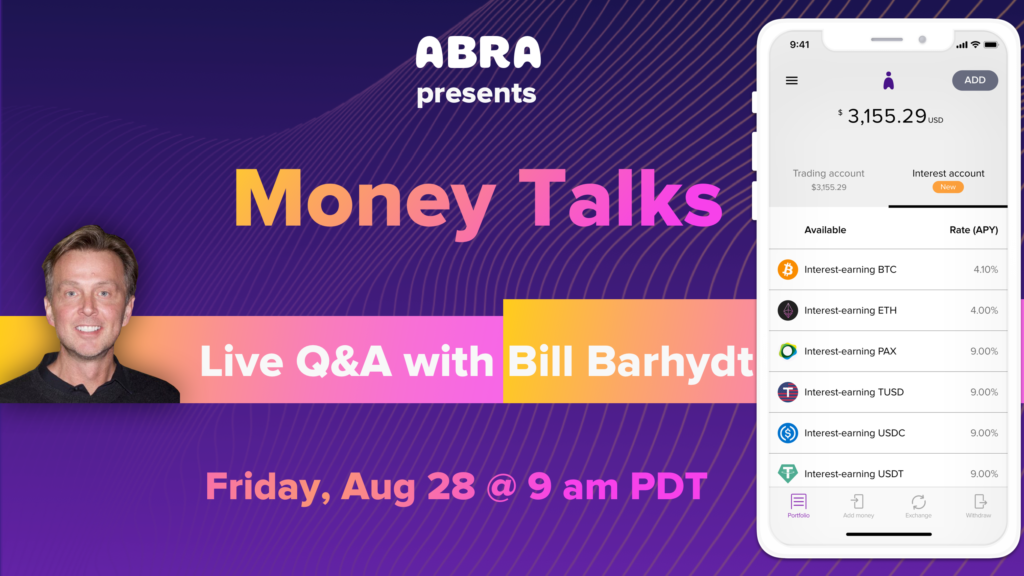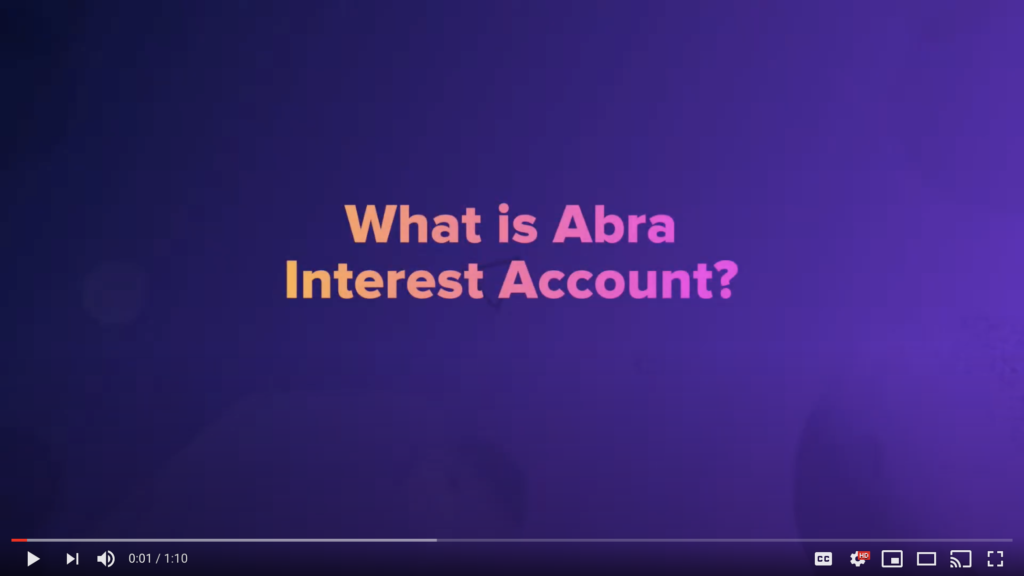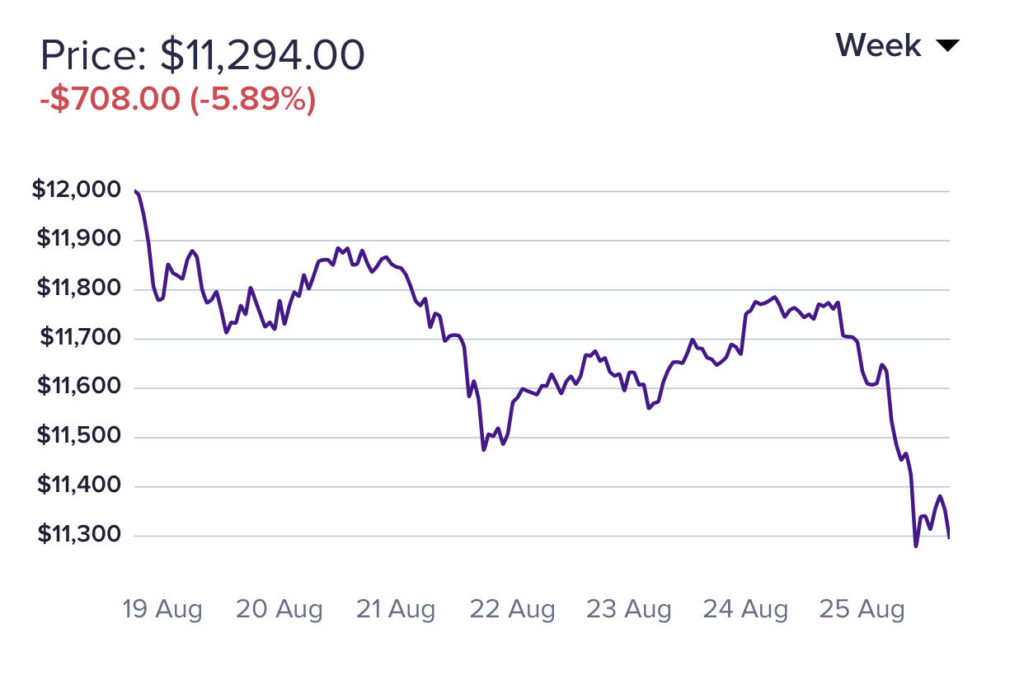Today’s Topics:
- The Future of Banking is Crypto
- The Hunt for Yield
- Crypto Markets
- Tweet of the Week
This week on Money Talks, Friday at 9 AM PDT (noon EDT)
On this week’s episode of Money Talks: Why is the future of banking going to be crypto? Where are we in the hunt for yield? As always, we answer all your burning Abra questions!
Note you may want to update or install your Abra app before the show starts to get a head start on the demos we’ll be doing!
Join us Friday at 9 AM PDT: https://youtu.be/fYCAZCAXDJ0
The Future of Banking is Crypto
Last week we talked about inflation and where to put your money. Putting money in interest bearing accounts like Abra, generating up to 10% on USD deposits, is just the first step.
Banks and money are the last of the legacy businesses that haven’t been put out of business and disintermediated by software and the Internet. Their time has come. Good riddance.
I believe the future of banking is crypto. Governments will eventually lose control of money and banking. I don’t know when it will happen but when it does it will happen very quickly. This transition will happen in stages. I can identify four distinct stages which may be overlapping:
- Crypto trading – Stablecoins are already replacing bank accounts for crypto trading. Myriad real world assets will be digitized. Derivatives and other banking functions will be imitated via several DeFi projects. Pricing oracles may become the truly important regulated entities in finance. Abra is playing here today by offering more than 75 crypto assets for trading and custody.
- Lending – Stablecoins will replace bank based settlement for loan distribution and collections. This is the first real competition to the traditional banking system. Abra is playing here today by offering yields of up to 10% on USD deposits and 4% on Bitcoin and Ethereum deposits.
- Payments – Card networks and p2p networks will disintermediate banks by settling directly via stablecoin. I’m sure we’ll see major payment systems use stablecoins in the coming weeks and months.
- Money – In parallel to the three phases outlined above Bitcoin will become a replacement to money. This process is already underway. As government currencies fail in Venezuela, Turkey, and Argentina local consumers have started to flock to Bitcoin. Governments will inevitably fight back. But these fiat failures are just accelerants. The actual rocket fuel is inherent in the hardness of Bitcoin as a financial asset. Hardness refers to the stock to flow value of Bitcoin versus even gold, which will eventually approach infinity as new Bitcoin stops being created.
The Hunt for Yield
There is a storm brewing between centralized and decentralized yield generating services. Both have pros and cons. Both options are getting a lot of attention right now as we’re living in a world where banks are offering zero interest on deposits and stocks seem out of touch with economic reality.
While the future may be DeFi (decentralized finance) consumers are currently better off with centralized solutions like Abra for generating yield. Why? The answer is trust and execution.
DeFi hacks in 2020 have led to over $35M in losses, probably more. In some cases, funds were subsequently recovered in other cases they were not. Many of the issues with DeFi based systems have to do with smart contract implementations. Testing “auto executing” contracts is very difficult and complex. Once you deploy the contract you can’t modify it. Bugs generally mean you have to deploy entirely new contracts and then figure out how to deal with existing contracts.
Centralized systems like Abra will also invariably have bugs, the difference being that Abra can fix bugs quickly and without the resulting bugs causing consumers’ funds to be siphoned off via malicious code. Over time DeFi systems may offer advantages in this area as open source code will become more mature. For example, Ethereum based ERC-20 contracts which are the basis for most stablecoins have become very stable and I’m not aware of any successful hacks in the recent past.
Execution
Here there is simply no comparison. Abra is able to offer rates that are significantly higher than DeFi services. For USD deposits such as those on USDT, TUSD or USDC Abra offers a 10% interest rate. DeFi services such as Compound and Aave are currently offering 3% on USD deposits via DAI. While these rates may converge with centralized services like Abra over time, for now the choice is clear.
The other issue with DeFi systems is the current dependency on Ethereum. Until Ethereum 2.0 is launched and proven it’s clear that Etheruem will continue to buckle under its own weight. The network is experiencing record high gas fees and congestion which will only get worse until proof of stake is live and working correctly.
The future of banking is crypto and the future of finance probably includes DeFi. Abra looks forward to embracing DeFi as it matures and addresses the trust and execution issues that Abra excels at dealing with today. For now, I’ll gladly place my trust with Abra and our experienced team of experts and ability to manage my custody, trading and crypto savings needs.
Generating Yield Redux
Last week I walked through the math on the effects of inflation on your cash and the impact of having an interest generating account like Abra. In case you missed it here it is again. If you’ve already seen it of course, you can skip to the end.
Let’s do a quick mental exercise. Let’s pretend you have $100,000. Let’s also assume that inflation is 2% per year. What to do with this money? (Hint: don’t rent a yacht and throw a party.)
First, if we leave all of our money in cash in a bank, what happens? With price inflation of 2% and currency inflation even worse, your money will be on a slow march towards being worthless over many years. After 25 years your account will still show $100k (given most banks now pay zero interest) but your money will be worth only $60,900 in today’s dollars. A net loss of about $39,000 due to inflation. Inflation compounds just like interest does! Woah.
Now, let’s assume we’re able to invest our money in an interest-bearing account generating 10%. Of course, let’s assume the same rate of inflation of 2%. After 25 years your account would show a huge increase to $1,083,470 and you would have the purchasing power of a whopping $684,847 in today’s dollars accounting for inflation. Wow.
So which scenario do I prefer? I clearly prefer the latter. That’s why I’ve put my money where my mouth is and have invested in the Abra Interest Account and will continue to do so. With the Abra Interest Account, I’m generating 10% on my US Dollar deposits and 4% on my Bitcoin and Ethereum deposits. I love getting my Monday morning messages on my iPhone that I have free cash or free crypto waiting for me in my Abra app. Of course, I just keep that money in the Abra Interest Account so the interest can continue to compound automatically.
It’s so easy. Just start your Abra app and click on the Interest account tab to get started.
Funds can be deposited via bank wire, ACH (US), cash at retail (where supported), transferred via external crypto wallets, or transferred from an existing Abra trading balance.
Crypto Markets
Bitcoin has retraced its August gains and currently sits at $11,294 re-establishing the consolidation pattern from early August. These consolidation patterns are often akin to a rubber winding itself up for a major move. In any case, day traders love this increased volatility. Regardless, the overall setup for Bitcoin and Ethereum is still very bullish in the mid term.
Tweet of the Week
My conversation with @billbarhydt is now on YouTube.
We discuss macroeconomics, the Federal Reserve, monetary policy, Bitcoin as a reserve asset in corporate treasuries, decentralization, and a number of new features that Abra has launched.
Enjoy!https://t.co/P3KG2lSu0n
— Pomp 🌪 (@APompliano) August 13, 2020
This week it looks like the US Federal Reserve is going to throw more fuel on the fire and explain why higher inflation rates are acceptable. What they won’t tell you is why this will create even more disparity between the 1% and everyone else. In this podcast with Pomp I get into this and other related topics including why I’m bullish on Bitcoin and bearish on the banks and the dollar.
See you all Friday on the next Money Talks. The Revolution has begun!
Don’t forget to follow us on Youtube, Twitter, and Facebook to stay updated with the latest from the crypto world.
Peace and Love,
Bill
Disclaimer: Abra Interest Accounts are issued by Prime Trust a Nevada Chartered Trust Company. Rates for Abra Interest Accounts are subject to change. Digital currencies are not legal tender, are not backed by any government, and Abra Interest Accounts are not subject to FDIC or SIPC insurance protections. Any opinions, news, research, analyses, prices, or other information provided here is a general market commentary and does not constitute investment advice. Abra does not recommend that any cryptocurrency should be bought, sold, or held by you. Do conduct your own due diligence and consult your financial advisor before making any investment decisions. Abra will not accept liability for any loss or damage, including without limitation to, any loss of profit, which may arise directly or indirectly from use of or reliance on such information.
.
About Abra
Established in 2014, Abra is on a mission to create a simple and honest platform that enables millions of cryptocurrency holders to maximize the potential of their assets. Abra enables both individuals and businesses to safely and securely buy, trade, and borrow against cryptocurrencies – all in one place. Abra’s vision is an open, global financial system that is easily accessible to everyone.
Why Abra
Based in the United States, Abra is available in over 150 countries and makes it easy to convert between crypto and a wide variety of local fiat currencies. With over 2MM customers, $7B in transactions processed, and $1.5B in assets under management, Abra continues to grow rapidly. Abra is widely loved and trusted – in April 2022, pymnts.com reviewed and rated Abra amongst the top 5 most popular crypto wallets in the market. Abra is backed by top-tier investors such as American Express Ventures and First Round Capital.
How Abra Protects Your Funds
Abra places clients’ financial objectives and security first. Abra practices a culture of risk management across all levels and functions within the organization.
Abra employs a state-of-the-art enterprise risk management framework that comprises a comprehensive set of policies, procedures, and practices detailing all applicable risk-related objectives and constraints for the entirety of the business. Abra has instituted a complete set of requisite systems and controls that continuously enforce these policies, procedures, and practices to manage all operations, including credit and lending. Abra’s independent Risk Committee comprises experienced compliance, risk, securities, and fraud operations professionals with backgrounds in industries ranging from traditional and digital assets banking, payments, remittance, to fintech.
Please visit our FAQ to learn more.







